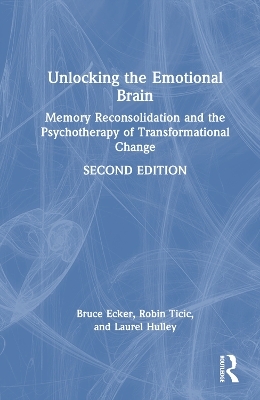
Unlocking the Emotional Brain
Routledge (Verlag)
978-1-032-13913-5 (ISBN)
This highly influential volume, now in a much-expanded second edition, delivers major advances for psychotherapy, all empirically grounded in memory reconsolidation neuroscience. A great increase of therapeutic effectiveness can be gained, thanks to a clear map of the brain's innate core process of transformational change—a process that does not require use of any particular system or techniques and is therefore remarkably versatile.
Twenty-six case examples show the decisive ending of a vast range of major symptoms, including depression, anxiety, panic, shame, self-devaluing, anger, perfectionism, alcohol abuse, sexual aversion, compulsive eating and obesity, paralyzed self-expression, and teen ADHD—all transformed through deeply resolving underlying disturbances such as complex trauma, lifelong oppression by systemic racism and homophobia, childhood sexual molestation, parental narcissistic domination, violent assault trauma, natural disaster trauma, and childhood traumatic aloneness and neglect.
This is a transdiagnostic, transtheoretical, lucid understanding of therapeutic action, based, for the first time in the history of the psychotherapy field, on rigorous empirical knowledge of an internal mechanism of change, and it achieves a fundamental unification of the confusingly fragmented psychotherapy field: diverse systems no longer seem to belong to different worlds, because they now form a wonderful repertoire of options for facilitating the same core process of transformational change, as shown in case examples from AEDP, Coherence Therapy, EFT, EMDR, IFS, IPNB, ISTDP, psychedelic-assisted therapy, and SE.
It's now clear why therapy systems that differ strikingly in technique and theory can produce the same quality of liberating change. Practitioners who value deep connection with their clients are richly rewarded by the experiential depth that this core process accesses, where no awareness had previously reached, whether sessions are done in person or via online video. It is an embarrassment of riches, because in addition we gain the decisive resolution of several longstanding, polarizing debates regarding the nature of symptom production, the prevalence of attachment issues, the operation of traumatic memory, the functions of the client-therapist relationship, the role of emotional arousal in the process of change, and the relative importance of specific versus non-specific factors.
Bruce Ecker, MA, LMFT, is Co-Director of the Coherence Psychology Institute, co-originator of Coherence Therapy, and co-author of the Coherence Therapy Practice Manual and Training Guide, Depth Oriented Brief Therapy: How to Be Brief When You Were Trained to Be Deep and Vice Versa, and The Listening Book. Robin Ticic, BA, HP Psychotherapy (Germany), is Director of Development and Training for the Coherence Psychology Institute, co-author of The Listening Book, author of the parenting guide How to Connect with Your Child, and a certified trainer of Coherence Therapy. Laurel Hulley, MA, is co-originator of Coherence Therapy, Director of Education for the Coherence Psychology Institute, co-founder of the Julia Morgan School for Girls, and co-author of the Coherence Therapy Practice Manual and Training Guide and Depth Oriented Brief Therapy: How to Be Brief When You Were Trained To Be Deep and Vice Versa.
Foreword by Alexandre Vaz Part One: The Emotional Coherence Framework: Equipping Psychotherapists for Unprecedented Effectiveness 1. Maximum Psychotherapeutic Effectiveness: The Reality of Transformational Change 2. How the Brain Unlearns: Memory Reconsolidation Explained 3. The Transformational Psychotherapy of Emotional Unlearning 4. The Moments of Fundamental Change in Slow Motion: Three Case Examples of Coherence Therapy 5. Is It Always About Attachment? Emotional Coherence and The Great Attachment Debate 6. A Framework for the Unification of Psychotherapy: Introduction to Part 2 Part Two: Hidden in Plain Sight: One Core Process in Therapies of Transformational Change 7. Accelerated Experiential Dynamic Psychotherapy (AEDP) 8. Emotion-Focused Therapy (EFT) 9. Eye-Movement Desensitization and Reprocessing (EMDR) 10. Internal Family Systems Therapy (IFS) 11. Interpersonal Neurobiology (IPNB) 12. Intensive Short-Term Dynamic Psychotherapy (ISTDP) 13. Psychedelic-Assisted Therapy: Ayahuasca 14. Somatic Experiencing (SE) Part Three: The Versatility of Coherence-Focused Psychotherapy 15. A Father's Tormenting Guilt: Deep Resolution in Seven Coherence-Focused Sessions 16. Up On Top From Down Below: Ending Compulsive Drinking Using Coherence Therapy 17. Bypassing Bypass Surgery: Using Emotional Coherence to End Compulsive Eating 18. Hearing Hostile Voices: Ending Psychotic Symptoms at Their Coherent Roots 19. Releasing Blocked Self-Expression from the Wounds of Systemic Racism: Coherence Therapy for a Deep Recalibration of Vulnerability 20. Don't Be That Way: Liberation from Lifelong Homophobic Oppression via Coherence-Guided Narratology 21. Life in the Stranglehold of Rules: Using Meditative Experience for Ending Insecure Attachment within Coherence Therapy 22. Young Teen Medicated and Misdiagnosed ADHD: Ending Hyperactive Behavior by Finding its Underlying Coherence 23. Plunging Moods and Erratic Behaviors "For No Reason": A Six-Year-Old Boy's Secret Fear Dissolves in Coherence Therapy 24. It's My Fault: Group Coherence Therapy fo Nine-Year-Old Children with Divorcing Parents
| Erscheinungsdatum | 21.04.2024 |
|---|---|
| Zusatzinfo | 7 Tables, black and white |
| Verlagsort | London |
| Sprache | englisch |
| Maße | 152 x 229 mm |
| Gewicht | 2100 g |
| Themenwelt | Medizin / Pharmazie ► Medizinische Fachgebiete ► Psychiatrie / Psychotherapie |
| ISBN-10 | 1-032-13913-7 / 1032139137 |
| ISBN-13 | 978-1-032-13913-5 / 9781032139135 |
| Zustand | Neuware |
| Haben Sie eine Frage zum Produkt? |
aus dem Bereich


